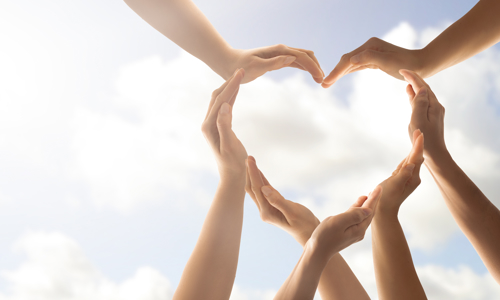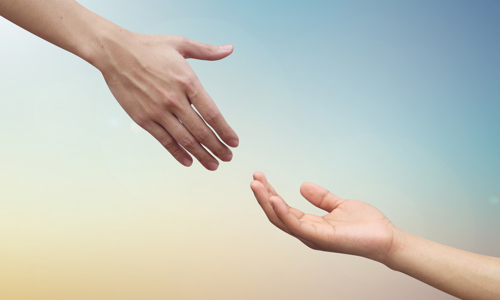Making sure you feel safe in your own home is really important to us. If you’re experiencing domestic abuse or you’re worried about friends, family or neighbours, we’re here to help.
Or you might be someone who's been abusive to others, and want help to change.

Get help now
If you or someone you know is in immediate danger phone the police on 999. If you’re not able to speak, press 55 at any time and you’ll be automatically transferred to the police.
Call the National Domestic Abuse 24/7 Helpline 0808 2000 247 or use the live online chat https://www.nationaldahelpline.org.uk/en/Chat-to-us-online
To talk to us about domestic abuse call 0345 366 4404 or email us safeguarding@yorkshirehousing.co.uk
If you want to speak to us in your own language, that’s no problem. Just let us know and we can get someone to help translate.
Check out the support that's available from specialist domestic abuse organisations and charities.
What's domestic abuse?
Domestic abuse is a terrible crime that can happen to anyone. We want you to know if you’re experiencing abuse, it’s not your fault and you’re not alone. We take reports of domestic abuse extremely seriously and we’ll help you get the support you need. You can find out more about our approach in our domestic abuse policy.
Domestic abuse comes in all different shapes and sizes. It’s any kind of behaviour that’s used to harm, punish, frighten, degrade or control someone. The most common types are physical or sexual abuse and threatening or violent behaviour.
Domestic abuse happens most often between people aged 16 or over. In most cases the abuser is a partner or ex-partner, but they might be a family member or a carer. Children are also affected by domestic abuse, both as victims and witnesses.
But how do you know if you’re experiencing or witnessing domestic abuse?
Types of domestic abuse
- Stopping you from going out, taking your car keys away
- Not letting you meet up with friends
- Keeping tabs on where you’re going all the time
- Telling you what time you’ve got to be home.
- Keeping you away from your family and friends
- Stopping you from coming and going when you want to
- Cutting off any childcare or help you get from outside your home.
This can be any violent or threatening physical contact including:
- hitting, kicking or punching
- Spitting
- Breaking bones or causing bruises
- Driving dangerously when you’re a passenger in the car
- Grabbing, burning and stabbing.
- Rape and any sexual acts you haven’t agreed to
- Taking away your birth control
- Forcing you into sex work
- Revenge porn (where private sexual pictures or videos are shared without your permission).
- Saying nasty things about your appearance
- Making you feel stupid and that your views and opinions don’t matter
- Gaslighting (someone always disagreeing with you or refusing to listen to your point of view to make you unsure about your own ideas and thoughts).
- Name calling
- Speaking in a threatening way
- Using language that’s threatening, humiliating, intimidating and frightening.
- Not letting you use your bank account
- Hiding your purse or wallet
- Stopping you from working and earning your own money
- Spending your money without permission
- Borrowing money in your name without permission
- Checking your bank statements all the time to see where you’ve been and what you’ve been buying.
- Following you to your work, your home or when you’re out and about
- Waiting outside your home
- Regularly sending you unwanted texts, voicemails, emails or letters.
- Stopping you from taking part in your religion, spiritual or cultural activities
- Cutting you off from your cultural community
- Criticising your cultural beliefs and practices
- Honour-based violence
- Forced marriage
- Female genital mutilation.
- Demanding to know your passwords and watching everything you’re doing on social media
- Putting tracking devices on your phone.
Pregnancy can be a trigger for domestic abuse, or can make existing abuse worse, putting you and your baby at risk.
- Speak to your GP, midwife or other health care professionals
- Get in touch with the specialist organisations who can offer you help and support.
2.4 million people experienced domestic abuse in England and Wales in the year ending March 2022
1 in 3 women aged 16-59 will experience domestic abuse in their lifetime
16% of all reported violent crime is domestic abuse
Source: Office for National Statistics
How we can help
Behind every statistic, there's someone who needs help. And that's what we're here for.
We’re committed to working with you so you can stay in your own home and feel safe. But it’s all about you deciding what’s right for you. We’ll never force you to do anything you’re not comfortable with. We’re here to give you support and advice but you’re in the driving seat.
There’s lots of different ways we can help, including
- Linking you up with the right people, experts in working with victims of domestic abuse, who can give you specialist support
- Taking enforcement action
- Putting together safety plans to help you stay safe
- Working with local councils, charities and voluntary organisations to get you the help you need
We can also help if you're someone who's been abusive to others and want help to change
- Talk to someone without judgement – call the Respect Phoneline 0808 8024040 Help For Domestic Violence Perpetrators | Respect Phoneline UK
- There are also support and training programmes that can help you to deal with the way you're behaving. You can find out more about what's available in your area by calling the Respect Phoneline or emailing info@respectphoneline.org.uk
Keeping you and your information safe
The chances are you’ll be feeling really scared, nervous and worried about contacting us. We understand and we know it’s a big step. We also want you to know we’ve got your back and we’ll do everything we can to keep you safe.
You can tell us the safest ways for us to contact you. Any conversations we have will be in private, and if we need to meet you, we’ll agree a safe location.
There are times when we’ll have to pass information on for legal reasons. But don’t worry, we’ll always speak to you first before we do anything.
We’ve got a Domestic Abuse policy that gives lots more info about what we’re doing to keep our customers safe. Drop us an email at safeguarding@yorkshirehousing.co.uk if you’d like a copy.
Domestic Abuse Housing Alliance membership
We’re proud to be a member of the Domestic Abuse Housing Alliance (DAHA) DAHA - Domestic Abuse Housing Alliance (dahalliance.org.uk). DAHA sets the standards for managing domestic abuse in the housing sector.
Don't suffer in silence
There's no need to suffer in silence or try to cope on your own. There's loads of help and advice available, from organisations who specialise in supporting people who're experiencing domestic abuse.

Other Yorkshire Housing support
Find out more about other things we can help you with.
